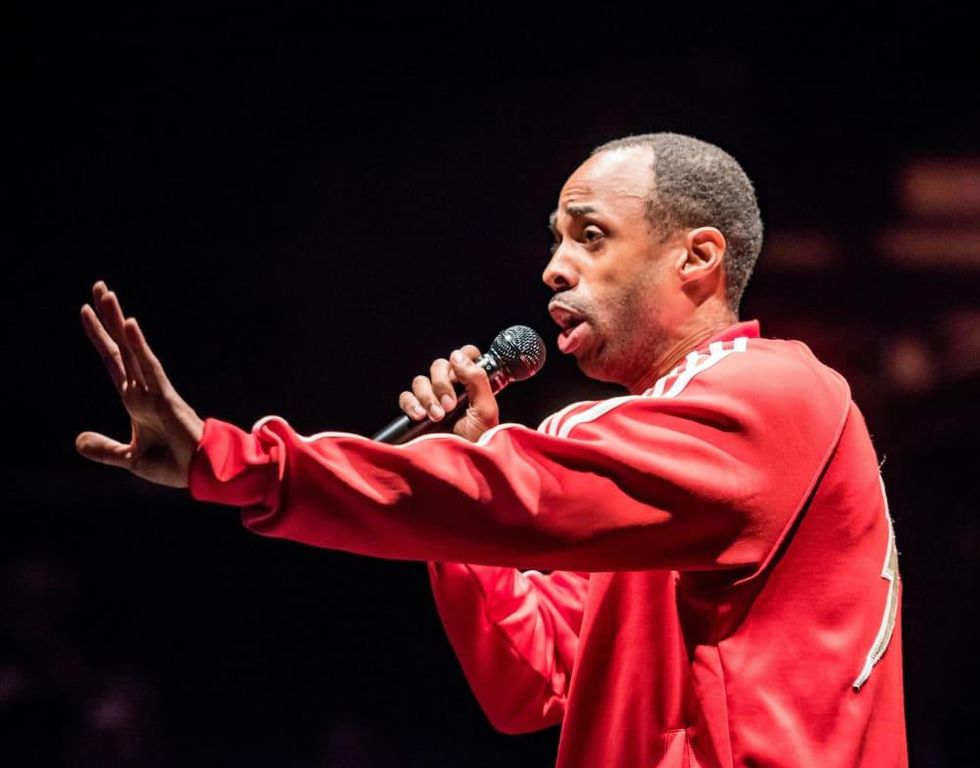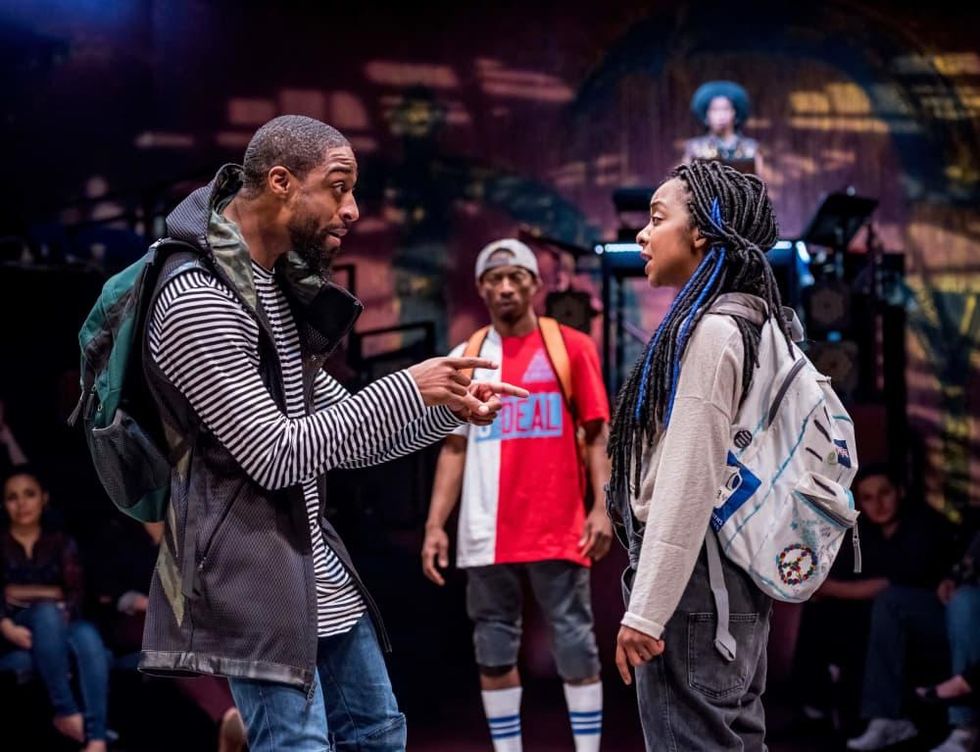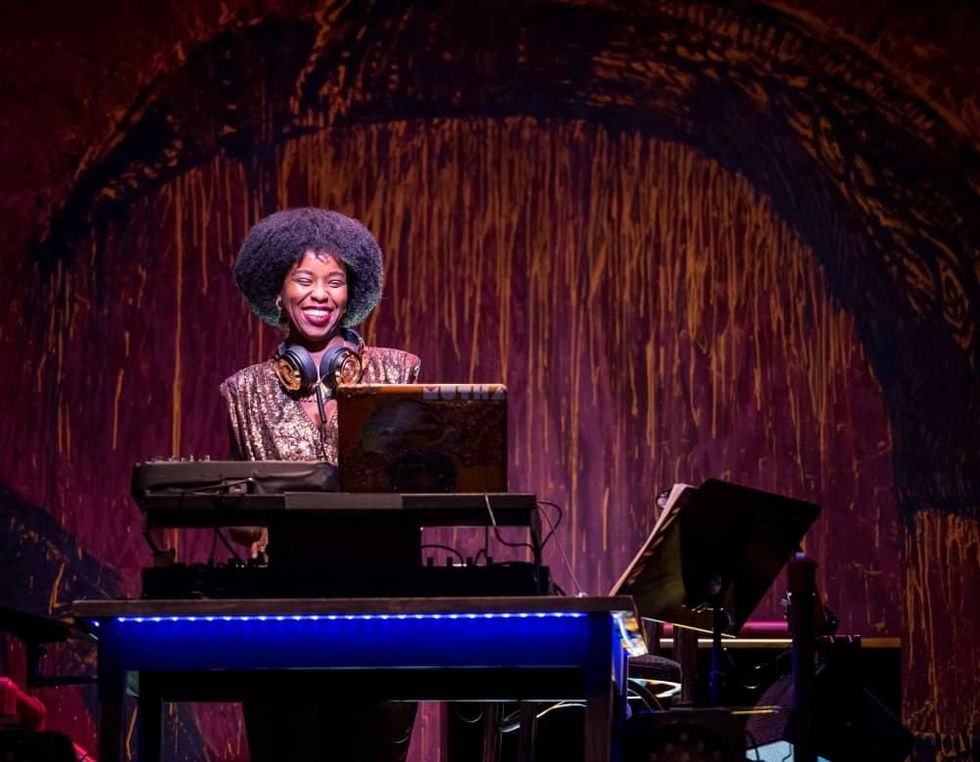World premiere
Alley's world premiere hip hop musical syncs traditional coming-of-age story to a killer beat
The biggest surprise of the Alley Theatre’s world premiere production of playwright NSangou Njikam’s Syncing Ink is not that Houston’s oldest theater company attempted a hip hop musical. No, the real shocker comes from the fact that Syncing Ink is probably one of the sweetest shows I’ve seen in years in its Neuhaus space.
The drama and occasional comedy the Alley reserves for its downstairs stage are usually more along the lines of demonically possessed puppets, dystopian cyber detectives and strong women falling into madness. While Syncing Ink has all the trappings of a more edgy contemporary play, including nonstop rhyming dialogue and a DJ (Robyn “DJ Reborn” Rodgers) supervising the whole proceedings, at its core lies a rather traditional coming-of-age story, just set to a killer beat.
Yes, Njikam, who also plays main character, Gordon, and the rest of the multi-talented and energetic cast spin many variations on the theme of the word “fuck,” but a R rating for language aside, the first act especially tells a decidedly gentle tale of a misfit’s struggle to fit in, a story that anyone who’s seen even one post-John Hughes high school movie in the past 30 years will spot many a trope.
The Rap Hero's Journey
Smart, earnest Gordon comes from a middle-class African-American family. His loving parents (Adesola Osakalumi and Kara Young), college sweethearts, remain happily married. He’ll likely get into a good college. His main problem is that while he can write beautiful poetry for his senior AP English class, he can’t freestyle and is desperate to become not just a rapper but a MC like the most popular kids in class, including Jamal (Nuri Hazzard) in the cool kid/jock role and Sweet Tea (played by Young as a word-warrior queen).
Fifteen minutes within the show we already know this talented girl-next-door type will be the one Gordon ends up loving and she’ll reciprocate, even through Young’s Tea shines much brighter than Gordon. Rounding out the high school movie archetypes are class clown, Ice Cold (Elisha Lawson), and dazzling new girl all the boys rhyme for, Mona Lisa (Mckenzie Frye).
Before seeing Syncing Ink, I thought the 10-ton ignored elephant in the theater was going to be Hamilton, now the one hip hop show all other even remotely similar styled musicals will be judged. Instead I found an elephant named The Karate Kid.
Still if a high school hero has a thousand faces, Njikam makes certain the route Gordon takes along his misfit-to-hero journey ventures into unique territory, schooling us on rap terminology and giving a history lesson on the rise of hip hop and the exalted figure of the MC. Under director Niegel Smith’s guiding hand, the characters and scenes slip easily into flashbacks, drug-induced dream sequences and spiritual epiphanies where hip hop terms like Flow incarnate into goddess-like creatures. The show is also just plain funny throughout.
With the exception of Nijkam, who only plays Gordon, all the actors nimbly (with excellent direction from Smith and choreographer Gabriel “Kwikstep” Dionisio) jump between multiple roles. Even Rodgers, with a bemused smile on her face as she shapes the soundscape, plays the benevolent presence of the hip hop Mutha. Word to her.
A New Song
The second act breaks free of some of the traditional coming-of-age plot beats, as Gordon heads to college and vacillates between giving up the words and flow that move through him, but that he can’t yet articulate, or embracing his musical destiny.
One of the show’s highlights comes from later scenes between Gordon’s two dueling college poetry professors, Brown and Black (Hazzard and Osakalumi, respectively and equally hilarious). In a haughty and intentionally fake-sounding British accent, Professor Brown advocates for written verse, while Professor Black argues for the oral tradition when spreading the sacred and profane Word. And this is where the play wrestles with ideas on storytelling, communication and art and becomes more than just audacious style wrapped around a rather too well-worn plot.
Gordon’s ambition and calling to become a MC, a skilled rapper, and win the ultimate live rap battle, requires him to create poetry in the present moment, spreading it on the wind instead of the page, even though those words might be lost by the next second, art in the immediacy, perhaps never to be duplicated. This quest seems to side with Professor Black’s oral traditions argument. Yet Gordon is played by playwright Nijkam, who not only wrote this all down in the pages of a script, he obviously went through multiple drafts.
Syncing Ink is not just any world premiere for the Alley. The company has spent time nurturing the work as the first play given full production after being selected for the Alley All New Festival last year. Smith also directed that workshop performance. The play’s own real life backstory, as well as just the fact it’s a play, perhaps never exactly performed the same on any given night but still working from a script, seem to give evidence for Professor Brown’s case.
In the end, these dueling ideas on the permanency of art remain something of a back vocal behind the main pulse of the show, which still lies with Gordon’s striving to join the community of MCs. Not that there’s anything wrong with spending two hours watching The Emcee Kid, but when Syncing Ink breaks from that hard-plotted beat to explore other melodies is when the real music happens.




